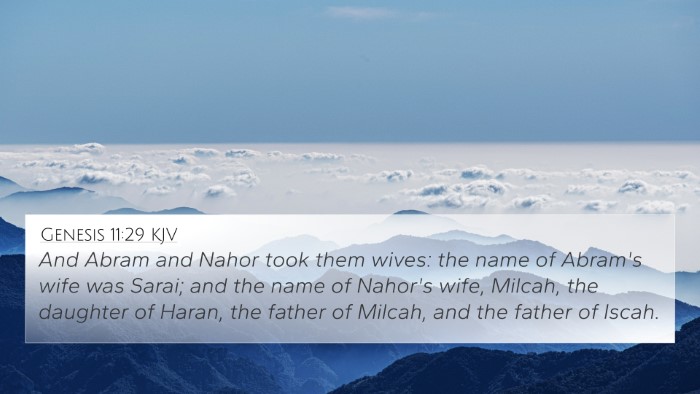Understanding Genesis 12:13
Genesis 12:13 states, "Say you are my sister, that it may go well with me for your sake, and that my life may be spared for your sake." This verse captures a moment of fear and a lack of trust in God's protection exhibited by Abram (later known as Abraham). In seeking to save himself, Abram instructs Sarai (later Sarah) to lie about their relationship.
The significance of this verse is multifaceted, as noted by various public domain commentaries. Here is a combined analysis reflecting insights from Matthew Henry, Albert Barnes, and Adam Clarke.
Main Themes
- The Fear of Man: Abram's redirecting of Sarai's identity stems from fear for his own life. His actions remind us of the Bible's teachings on the importance of trusting God's provision.
- Human Frailty: This narrative does not depict Abram as a flawless figure; instead, it reflects human vulnerability and moral complexity.
- Divine Sovereignty: Despite Abram's lack of faith, God remains faithful and protective. The incident serves as a demonstration of God's providence, working through human failings.
Commentary Insights
According to Matthew Henry, this verse illustrates how humans often resort to deceit when faced with danger, reflecting a lack of faith in God’s promises. He emphasizes the consequences of this decision, which may tarnish an individual’s reputation and exemplify the repercussions of mistrust.
Albert Barnes notes the cultural context—where the protection of family and life often necessitated such claims. He posits that Abram's strategic yet morally questionable choice reflects a behavioral pattern in biblical narratives emphasizing survival instincts.
Similarly, Adam Clarke speaks to the moral implications of lying and the complexity of Abram's situation, pointing out that his actions were not isolated but part of a broader narrative of faith and failure in the patriarchal lineage.
Bible Verse Cross-References
- Genesis 20:2: Similar circumstances arise when Abraham deceives Abimelech regarding Sarah.
- Exodus 20:16: The commandment against bearing false witness can be seen in light of Abram's deceit.
- Psalm 56:3-4: The psalmist expresses trust in God in the face of fear, contrasting Abram’s reaction.
- Romans 4:20-21: Highlights Abraham's later faith in God’s promises, serving as a contrast to this moment of doubt.
- Hebrews 11:8-10: References Abraham's faith journey and obedience despite earlier lapses.
- Genesis 12:1-2: Discusses God’s call and promises to Abram, suggesting a divinely directed plan that Abram momentarily doubts.
- Proverbs 29:25: “The fear of man brings a snare,” correlates with Abram's fear-driven decisions.
- Philippians 4:6-7: Encouragement to present our fears to God instead of devising our own solutions.
- Matthew 10:33: Jesus speaks on the cost of denial, echoing Abram's choice to hide the truth.
- 1 Peter 5:7: The call to cast our anxieties upon God stands in stark contrast to Abram's handling of his fears.
Connections Between Bible Verses
By exploring Genesis 12:13 and its cross-references, we can appreciate the broader themes of faith, fear, and God's unwavering protection throughout scripture. The interconnectedness of these verses enriches our understanding and highlights the complexities of trusting God amidst human uncertainty.
Thematic Bible Verse Connections
The themes surrounding Genesis 12:13 are prevalent in many biblical narratives. The struggle between fear and faith is echoed in both the Old and New Testaments, where believers encounter similar trials. The application of Abram’s story encourages readers to consider their own responses to fear and the importance of placing trust in divine providence.
Tools for Bible Cross-Referencing
A variety of tools are available for those interested in exploring cross-referencing in the Bible. Utilizing a bible concordance or a bible cross-reference guide can significantly enhance comprehension of biblical texts, facilitating a deeper study of how verses relate to one another. Engaging in cross-reference Bible study methods allows believers to identify connections and develop a cohesive understanding of God’s message throughout scripture.
Conclusion
Genesis 12:13 serves as a pivotal verse that underscores the complexities of human experience in the face of divine promises. By reflecting on this scripture, alongside other cross-referenced verses, we can draw better insights into the nature of faith, the challenges that arise, and the encouragement to trust in God’s reliability and grace.

















